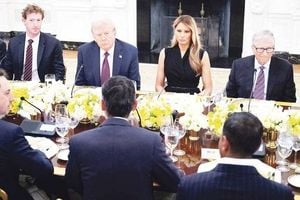The CIA has released and declassified its long-awaited assessment on the origins of COVID-19, concluding most likely, but with low confidence, the virus originated from a laboratory rather than natural sources. This assessment came to light on February 1, 2025, as White House Press Secretary Karoline Leavitt praised CIA Director John Ratcliffe for his role in the release.
According to the agency's findings, the totality of evidence leans more toward the theory of lab origin. Despite this, the report’s low degree of confidence raises questions about the strength of the evidence and leads to concerns over its completeness and reliability.
The report did not emerge from any new intelligence. Instead, it drew on previously established intelligence pertaining to the virus's spread and the conditions within virology labs, particularly those located in China. This assessment marks the culmination of months of scrutiny and debate surrounding the origins of the pandemic, which has had far-reaching global consequences.
The CIA's evaluation has not only reignited debate but has also been strategically positioned within the prevailing political discourse. Leavitt emphasized how this finding is aligned with former President Donald Trump’s assertions on COVID-19's origins when she stated, "The assessment was in line with President Donald Trump's views on the origins of the virus." These words highlighted the former administration's long-held beliefs about the pandemic's beginnings.
The assessment, completed at the behest of the Biden administration and former CIA Director William Burns, was ironically deemed worthy of release shortly after Ratcliffe took office as the CIA leader. His decision to move forward with the declassification centered on transparency but also on the political ramifications it engenders.
Interestingly, the findings are indicative of the CIA's careful navigation through sensitive political waters. While the conclusion points toward laboratory origins, the lack of solid confidence suggests the CIA is wary of jumping to definitive conclusions without more substantive evidence.
The COVID-19 virus, first identified in Wuhan, China, has been the subject of extensive study and speculation since its emergence. The World Health Organization (WHO) conducted investigations earlier, prompting vociferous discourse around lab leaks and biosecurity in the wake of widespread illness and death.
Many have raised concerns over lab safety protocols, and the political pressure surrounding the virus’s origins has culminated in fears of bioweapons and neglect of safety regulations. The CIA’s report adds fuel to this fire, inviting scrutiny not only of China's practices but also of what U.S. intelligence knew and when.
The repercussions of this assessment are sure to resonate through the halls of Congress and within public opinion. Many stakeholders demand accountability and facts, leading to increased pressure on the Biden administration to respond to claims about foreign laboratory mishaps.
Despite the report being publicly accessible, analysts warn of misinformation and narrative-building around its contents. With various political figures seeking to leverage this information for their agendas, discerning the truth may become increasingly complex.
Looking forward, it is likely this document will not be the last word on the topic. Investigations are expected to continue, some even hinting at potential inquiries against China’s state actions during the initial phases of the pandemic. For many, the question remains: how much do we truly understand about the origins of COVID-19, and will this CIA report open new pathways for accountability?
While researchers and politicians alike continue to dissect this report, the narrative surrounding COVID-19’s origins is expected to evolve, possibly impacting global relations and scientific collaboration moving forward. President Biden’s administration must now navigate the fallout of the release, balancing pressure to address the report’s conclusions with the intricacies of international diplomacy.



